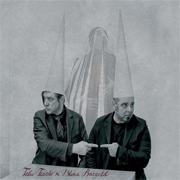A trans-Alpine alliance of the highest order, Still Smiling sees Blixa Bargeld join forces with Italian composer Teho Teardo for a bold, 13-track, hour-long album released on Italy’s Specula label. Despite his distinctive, domineering voice, Bargeld is a master collaborator who adapts readily to many forms, from Alva Noto’s scratchy electronics on 2011’s anbb album Mimikry, to his garrulous interpretations of Nico’s ‘Mutterlein’ and ‘Abschied’ on X-TG’s superlative Desertshore project of last year. If, as Bargeld told me in 2010, the "the gigantic monster Einstürzende Neubauten is going to go to sleep on the bottom of the ocean for a while", its roar is still very much awake.
Bargeld and Teardo met through their involvement in Ingiuria, a 2011 theatrical piece, after which they joined forces on the soundtrack to the film A Quiet Life – a track bearing the same name is featured here. Throughout, Bargeld sings in Italian, English and German, the clarity of his pronunciation as ever adding to the poetics of his lyricism, as well as highlighting his all-too-frequently ignored wry humour.
Indeed, explorations of language and the soul appear to be at the core of this album, with Bargeld beginning the album on ‘Mi Scusi’ by apologising for his accent and Italian, and wondering "can I kiss in another language?" On ‘Konjunktive II’ (tr. ‘Subjunctive II’) grammar becomes an exploration of disdain at the self – "alone, i.e. not me" – a stark contrast to Neubauten cocaine anthem ‘Yu-Gung’s demented scream of "feed my ego".
Musically, Still Smiling is so absorbing and enduring a listen thanks to its range of melodic ideas and well-executed experimentation. Its sequencing and structure is no doubt so eloquent thanks to Teardo’s history in film and theatre. The Balanescu Quartet also give a great performance on three of the tracks, especially on ‘Come Up And See Me’, with its almost histrionic ballet between strings and a pleading vocal of "come up and see me some time" over roughly clacking rhythms. This in turn is juxtaposed with sentences spoken rather than sung: "the man who screwed a whole country… are you happy to see me or is that a gun in your pocket?" They’re presumably references to Silvio Berlusconi, given that they’re accompanied by a listing of Italian media outlets. This rich palette is used to great effect throughout the record, giving it a great emotional heft.
Elsewhere, the abstract acts as a foil to the fuller-sounding material. ‘Axolotl’, for instance, begins with aggressive, bassy hacks at a low string, before it suddenly drops out to create space for a watery recording and hi-pitched whine – its otherworldly warmth is reminiscent of Coil’s music for Derek Jarman’s Journey To Avebury. Halfway through, the cello strokes return and Bargeld announces "Ich bin ein kleines Axolotl…", before at the end of the track his infamous screech swoops evilly above the strings. It segues seamlessly into the ominous ‘Buntmetalldiebe’ (tr. ‘Metal Thieves’), a treatise on the contemporary blight of metal thieves – which, it must be said, seems a little rich given Neubauten’s means of sourcing their instrumentation in the early days of the group.
Fans of Bargeld’s alma mater will be familiar with the kind of rhythms that make up ‘Still Smiling’, where again there’s a wit to the darkness – "I’m smiling from the bottom of my fair trade soul / I’m smiling / though it hurts sometimes" – while ‘Alone With The Moon’ (a cover of the track by Brecht-inspired Tiger Lillies frontman Martyn Jacques) has Bargeld in fine croon. The swell of ‘What If…’ is an album high point, a portentous build behind the doubts of a suicide bomber: "what if in paradise there are no huris waiting / what if it’s all just a mistake in translation?"
As a lyricist, Bargeld has long played with language by becoming a collector of words and things, often in list form – and so it is here, from "chocolate moose and calvados" (‘Nocturnalie’) to "Henry Moore… cadmium, cobalt… zinc… 12 meter eisenbrucke" (‘Buntmetalldiebe’). This collaging of words is explored again in ‘Nur Zur Erinnerung’ – probably the track that’s sonically closest to recent Einstürzende Neubauten LPs – running through different geological periods, before dreaming that "everything must return to go", allowing rebirth: "I reassemble myself / from intergalactic trash".
On ‘A Quiet Life’ there’s a similar sense of yearning, but now doomed: "I thought I had been given / Another chance again / But heaven lies as usual… no quiet life for me." This seemingly rather personal lyricism is intriguing – closing track ‘Defenestrazioni’ features a musician’s complaint about the routines of touring ("taxi airplane taxi… room service or masturbation") and interviews (a female voice asks "Can I ask you a stupid question? Are you going back to play with Nick?") over a woozy, twinkling backing.
It is, of course, rather tempting to put two and two together and start thinking that, perhaps, this is the most confessional we’ve heard Blixa Bargeld to date. But the album’s artwork – featuring the singer and Teardo pointing at each other, facing in opposite directions while wearing huge pointy hats that are half Dada artist Hugo Ball and half Pet Shop Boys – suggests that the truth is rather more complex. Still Smiling is a playful, intelligent album, a series of personal and observational sketches of a disquieting world.


